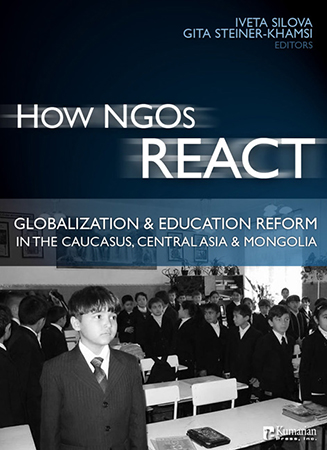
- 2008/303 pages
- A Kumarian Press Book
How NGOs React:
Globalization and Education Reform in the Caucasus, Central Asia and Mongolia
Paperback: $27.95
ISBN: 978-1-56549-257-8
How NGOs React follows the Soros Foundation's educational reform programs in the Caucasus, Central Asia, and Mongolia and raises larger questions about the role of NGOs in a centralist government, relationships NGOs have with international donors and development banks, and strategies NGOs use to interpret global reforms locally.
The authors, all former or current educational experts of the Soros Foundation, analyze "the post-socialist reform package" at the country-level, highlighting the common features such as decentralization, privatization, vouchers and liberalization of the textbook publishing market. They look at the global reforms and their variations as they were transferred to Armenia, Azerbaijan, Georgia, Kazakhstan, Kyrgyzstan, Mongolia, Tajikistan, Turkmenistan, and Uzbekistan over the past decade.
A unique combination of perspectives from Western as well as Eastern scholars based in the region makes this collection an essential retrospective on key processes involved in transforming educational systems since the collapse of the socialist bloc.
The authors, all former or current educational experts of the Soros Foundation, analyze "the post-socialist reform package" at the country-level, highlighting the common features such as decentralization, privatization, vouchers and liberalization of the textbook publishing market. They look at the global reforms and their variations as they were transferred to Armenia, Azerbaijan, Georgia, Kazakhstan, Kyrgyzstan, Mongolia, Tajikistan, Turkmenistan, and Uzbekistan over the past decade.
A unique combination of perspectives from Western as well as Eastern scholars based in the region makes this collection an essential retrospective on key processes involved in transforming educational systems since the collapse of the socialist bloc.





